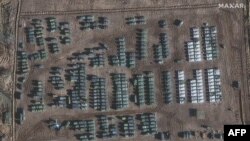Russia's military buildup along its border with Ukraine is not yet setting off any alarms in Washington.
The United States' highest-ranking military officer Wednesday said the U.S. was aware of Moscow's military movement, describing it as "significant" but also as "nothing overtly aggressive."
"We've seen this before," General Mark Milley, the chairman of the Joint Chiefs of Staff, told a security forum in Washington, noting Russia's annual Zapad exercises often involve tens of thousands of troops.
"So, what does this mean? We don't know yet," Milley said. "But we're continuing to monitor with all of our capabilities."
U.S. military and intelligence officials voiced repeated concerns this past April, after Russia massed as many as 150,000 troops along its border with Ukraine, calling that buildup the biggest since Moscow's invasion of Crimea in 2014.
But Milley's comments come as tensions between Russia and the U.S. and NATO appear to be again on the rise.
Russia this week complained about U.S. and NATO activity in the Black Sea as its naval forces practiced destroying enemy targets in the Black Sea.
And last month, Russia suspended its diplomatic mission to NATO in retaliation for the expulsion of eight Russian officials.
In an apparent effort to lower tensions, U.S. President Joe Biden this week sent his top spymaster, Central Intelligence Agency Director William Burns, to Moscow for a series of talks.
According to a statement from the U.S. Embassy in Moscow, Burns was to meet with "members of the Russian government to discuss a range of issues in the bilateral relationship."
While not commenting directly on the talks, Milley voiced support for discussions.
"I firmly believe that you should not only talk to your allies and partners and friends, but you absolutely need to talk to your adversaries and your enemies," Milley said Wednesday. "The last thing this world needs, the last thing the United States needs or anybody else needs, is a great power war. And so, the extent to which we the military or NATO, through intermediaries or directly, can communicate back and forth with Russia, China or any other country, I think is in the plus column of things to do."
This past June, the U.S. gave Ukraine a $150 million security package aimed at bolstering the country's defensive capabilities.
Some information for this report was provided by Reuters.










